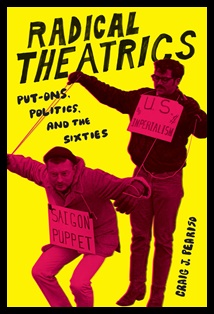In 1967, I was married and had a five year old. While others were in Washington protesting the Vietnam War, the most I could do was make a peace banner and hang if off a branch on the tree half-way up our driveway.

What I would have love to have done is political street theater, like the Yippies, who became famous when they banded together in the mid-sixties to “Stick it to the Man”. At the 1968 DNC convention they organized an absurdist counter-convention — including nominating a pig for president. They named themselves the Youth International Party to give themselves a sense of legitimacy.
Their colorful protest methods were tailor made for the television cameras .For example, once they poured into the vast main concourse of Manhattan’s Grand Central Station 3,000 strong, wearing their customary capes, gowns, feathers and beads. They tossed hot cross buns and firecrackers, and floated balloons up toward the celestial blue ceiling. They hummed the cosmic “Ommm,” snake-danced to the tune of Have a Marijuana, and proudly unfurled a huge banner emblazoned with a lazy “Y.”
While Yippies were a radical bunch, their basic philosophy paralleled the movements today to establish equality in all areas of American life: We want everyone to control their own life and to care for one another … We cannot tolerate attitudes, institutions, and machines whose purpose is the destruction of life, the accumulation of profit.
The Yippies used mockery, ridicule and silliness to call attention to the wrongs of our society. Imagine how our current president would be affected by this kind of outrageous public contempt. What if a new generation of Yippies performed an exorcism on the White House, the way they did it on the Pentagon in 1967 at the “Be-in” protest against the Vietnam War.
This is how it went back then:
The initial conception of the protest had been to occupy the Capitol, but that might have sent the wrong signal to the public, suggesting that the marchers wanted to shut down the democratic process and thus were offering only more political negativity.

So, instead, they came up with the idea of an exorcism that would levitate the Pentagon 300 feet. Since the five-sided pentagram was symbol of the occult, representing evil forces at work in the world, the Pentagon was a natural symbol of the evil war and itwould serve as a far more resonant target than the Capital.. Time magazine later reported the intention of the proposed ritual would turn the Pentagon “orange and vibrate until all evil emissions had fled” and the war would come to an immediate end.
On the makeshift altar before the Pentagon, a number of competing rituals began simultaneously to unfold. Ed Sanders, of the rock band the Fugs, delivered an impromptu, sexually suggestive invocation punctuated with repeated calls of “Out, demons, out!” Allen Ginsberg declaimed mantras for the cause.

Two hundred pounds of flowers were trucked in and distributed to the crowd. When military police and marshals confronted the protesters, images of gun barrels blooming with daisies became the iconic photographs of the day.

As we approach November, I can’t help wishing there were a new version of the Yippies to dramatize the absurdities of our current Cheeto-in-Charge. I’m not suggesting that they disrupt the convention; rather I’m suggesting that for the two months before elections, a swarm of costumed political pranksters organize “guerilla theater” events to draw the attention of the public and the media to (my words) drive tRump even more crazy.
If he is even the least bit superstitious, I’m sure that anything smacking of magic and mystery will fuel his paranoia and insecurities. So how about an exorcism on the White House to rid it of negative energies — racism, bigotry, misogyny, elitism, etc. etc.
While there are no more Yippies, perhaps a gathering of witches:
ON MIDNIGHT LAST Friday, all over the United States, an alliance of magical practitioners called the Magic Resistance gathered Tarot cards, feathers, orange and white candles, pins, water, salt, matches, ashtrays, and unflattering photos of President Trump. The objects are prerequisites for a binding spell, an incantation typically used to keep someone from harming themselves or others, like a magical straitjacket.…
..Magic (and particularly witchcraft) has been a form of protest for decades, probably centuries, but protest magic has burst into the media and broader public consciousness only twice in recent memory: during the 1960s and now, during Trump’s presidency. In the ‘60s there were the yippies, but also the Women’s International Terrorist Conspiracy from Hell—W.I.T.C.H.—a pointy-hatted wing of the women’s liberation movement.
https://www.wired.com/story/trump-witches/
In 2016, the anonymous W.I.T.C.H. movement was resurrected by a group in Portland, Oregon, inspired by the injustice they see in the world around them, and in their own backyards ….. Sometimes they hand out tarot cards at events, edited to include a message such as “A vote for the health-care bill will mean DEATH for millions of Americans” on the death card. On their YouTube channel, they posted a video of one of the rituals they performed before a protest: the “binding” of Donald Trump.
The exorcism of the White House can be done virtually on a specific night over Zoom or some other platform. With enough chatter about it over social media before hand, perhaps the mainstream media might also cover it. The point would be to make our Hitler-Wannabe nervous and insecure as he is surrounded by the notion that mysterious enemy forces, over which he has no control, gave gathered to erode his power and his sanity. What great fun to add some fun to ensuring that he loses the election.
These are the sites I used for background information:
https://www.history.com/news/yippies-1968-dnc-convention




 Google it. Lots of stuff out there about that.
Google it. Lots of stuff out there about that.